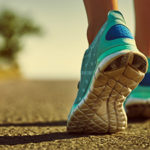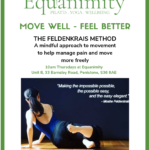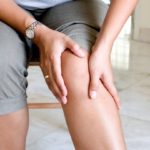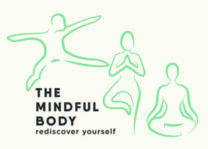
Yes, apologies for the pun but here we are nearly at the end of a soggy February and many of us are looking forward to better days and drier weather. I’m grabbing any respite from the rain to get out in the fresh air – as we all now, daylight and the open air is good for our mental and physical health. My next workshop is all about better walking and running, whether you’re a couch potato that needs to find the propulsion to get up and go, an active walker/runner that keeps finding discomfort after activity or you would simply like to find a better swing to your stride, come along to “Improve Your Stride” on Saturday 7th March 2020 from 10.30-12.00pm. The workshop is at Remedy House, 24 Wilkinson Street S10 2GB and costs £20 per person or £36 for two. I guarantee you’ll feel the difference.
Author Archives: Dianne
New Practice Rooms…at The Practice Rooms!
from 1st February 2020, I’ll be seeing 1:1 clients at a brand new venue, The Practice Rooms in Sheffield. This venue is in a lovely old beautiful building, close to the centre of Sheffield and has 10 rooms especially designed for holistic health and therapy. You can have a look at my link right here https://thepracticerooms.co.uk/find-a-therapist/profile/dianne-hancock
More Workshop Reviews!
In my last post, I mentioned some of the comments following my January workshops. Here’s another: “I loved the way we stretched in the class which had a significant impact later but was almost unobtrusive in that I don’t realise the extent to which I’m stretching whilst I’m doing it. Most certainly felt two inches tall at the end and “active” once I arrived home. There were a number of stretches I can do in bed too which is a great way of starting the day.”
Happy New Year!
2020 has got off to a great start for the Mindful Body with two fully booked workshops. The first – “Moving with Your Whole Spine” – was on 4 January 2020 and I got some lovely feedback from participants. “I feel like I’ve got a whole new body!” one woman said at the end of the session. It is so rewarding to give people the experience of better movement. Workshop No.2 was in the lovely Equaminity Studio at Penistone on Saturday 11 January and that theme was “Functional Feet”. Here’s one review: “Thank you for a great workshop, Dianne. As a Reflexologist, I don’t often get a chance to ‘twiddle with my own toes’! This gentle and subtle Feldenkrais movement therapy really makes your brain work – strangely! I felt relaxed and sleepy afterwards – and yet more aware of my body and more alert at the same time. Looking forward to the next workshop.” Upcoming classes and workshops can be found here
The Mindful Body comes to Penistone
I’m very pleased to announce that I will be starting a new Feldenkrais class at Equaminity Studios in Penistone this week. The new class will be from 10 – 11am every Thursday and is suitable for those new to the Method and for people who have already enjoyed the benefits of The Feldenkrais Method and how it can help you to improve your movement range with ease and comfort. Email info@equaminitypenistone.uk to book.

Back to School!
I’m back after a long break from posting here. My apologies, but sometimes life gets too busy communicating to communicate! I hope you’ve had a great summer and I’ve enjoyed meeting a lot of new clients over the last few months, as well as planning new classes and collaborations for the autumn. A full and up to date version of the new classes and events is in the calendar and you can also go to the Classes page to see what’s on offer.
Preventative action
In the news this week there has been a lot of discussion about NHS funding, where and how the money should be spent. I feel very strongly that we need to invest in preventative care – particularly as in the UK we have a large proportion of our population that is over 65 years. Small changes to lifestyle and habits around exercise, diet and personal care can make a real difference in avoiding larger problems later on. It is not down to the medical practitioners to make these changes: every individual would benefit from greater knowledge and ownership of their personal health. In general matters we go through life amazingly ignorant of many things that directly affect us and it’s only when things go wrong or break down that we get involved in the mechanisms and processes that help us function. This might be the workings of the combustion engine or…more importantly, our own mental and physical health. We need a good health service that is safe and reliable but we also need to challenge our own passivity: returning again and again to a chiropractitioner to solve the same problem always reminds me of Albert Einstein’s well known definition of insanity “doing the same thing over and over again and expecting different results”. Again Einstein…”We cannot solve our problems with the same thinking we used when we created them.”
And breathe…
 I can’t believe that next week will be the beginning of December and so the last Saturday workshop of 2018! It’s been an action-packed and very eventful year both personally and globally so the theme of this workshop “Take A Breath” seems very apt. We can often feel overwhelmed by the pace of life and the expectations we create for ourselves: therefore it is very important to find time to pause, reflect and simply, take a breath. This December workshop will focus on breathing, mindfulness and relaxation techniques to help build personal resilience and equip you for the month ahead. You can book by going to the bookings page here
I can’t believe that next week will be the beginning of December and so the last Saturday workshop of 2018! It’s been an action-packed and very eventful year both personally and globally so the theme of this workshop “Take A Breath” seems very apt. We can often feel overwhelmed by the pace of life and the expectations we create for ourselves: therefore it is very important to find time to pause, reflect and simply, take a breath. This December workshop will focus on breathing, mindfulness and relaxation techniques to help build personal resilience and equip you for the month ahead. You can book by going to the bookings page here
More information is on the Classes page here
Washington Post Article
This is a great article from a very honest writer who was completely new to The Feldenkrais Method: “All of this minimal effort is harder than it seems — particularly for people like me who tend to thrive on stress, then collapse from it in a continuous loop”. Well worth a read! Click here
Take the Stress Out of Your Knees!

Coming up next week on 3rd November is my First Saturday workshop “Take The Stress Out Of Your Knees”. The most common problem active people develop is pain and stiffness in the knees. Too often this is because you are not using the pelvis or the ankles efficiently so additional strain is transferred to the knee joints – strain that those joints aren’t designed for. This workshop will explore better movement pathways to support walking and running without strain. Book now on this link or email me on dianne_hancock@hotmail.com
